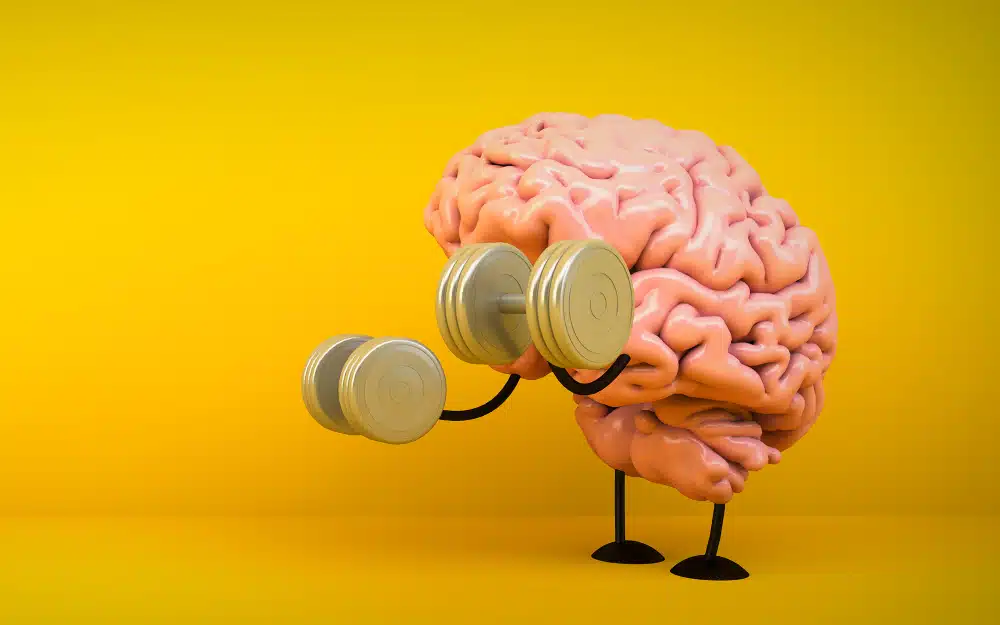محور حياتنا هو الدماغ فكيف تمرنه ليعطيك الأفضل؟

محور حياتنا هو الدماغ فكيف تمرنه ليعطيك الأفضل؟
محور حياتنا هو الدماغ فكيف تمرنه ليعطيك الأفضل؟
تشكل الشبكة العصبية المعقدة داخل جمجمة الإنسان كل جانب من جوانب حياته، إذ ينبع داخلها نحو 100 مليار خلية عصبية تنطلق ليل نهار. ولحسن الحظ، يوجد تأثير أكبر على بنية الدماغ وعمله مما أدركه العلم من قبل. بل يمكن تعزيز الإدراك والتنظيم العاطفي والصحة العقلية من خلال التدريب الموجه، وفقا لما ورد في سياق تقرير نشره موقع New Trader U.
المرونة العصبية
توفر المرونة العصبية المفتاح – قدرة الدماغ على تجديد وتغيير وتشكيل اتصالات جديدة استجابة للتجارب والمحفزات. يعتقد العلماء أن الاتصالات العصبية على مر التاريخ قد تم إصلاحها في وقت مبكر من الحياة. ولكن كشفت الأبحاث الرائدة في الستينيات أن الدماغ يتكيف ويتعلم بشكل مستمر.
“ما لم تستخدمه ستخسره”
ينطبق القول المأثور “استخدمه أو اخسره” على القدرات العقلية، حيث إن ممارسة مناطق الدماغ الرئيسية تقوي المسارات العصبية الموجودة وتحفز نمو الخلايا العصبية. مع ازدياد قوة العضلات من خلال التدريب المستمر، تعمل تمارين الدماغ المستهدفة على تقوية نقاط القوة المعرفية والعاطفية.
أساليب مدعومة علميًا
يمكن استخدام الأساليب المدعومة عمليًا “لتدريب العقل واختيار الأنشطة التي تأسر الاهتمامات، من أجل الوصول إلى التحسينات المستمرة في الذاكرة والتعلم ومدى الانتباه والتخطيط والتحكم في الاندفاعات ممكنة مع الاتساق مع مرور الوقت. إن التدريب العقلي لا يمنع التدهور المرتبط بالتقدم في العمر فحسب، بل يطلق العنان للقدرات التي تتيح نوعية حياة أكثر ثراءً، كما يلي:
1. تعلم مهارات جديدة
إن ممارسة الأنشطة المحفزة للعقل بانتظام تعمل على تنشيط نمو خلايا الدماغ والتواصل بين مناطق الدماغ المختلفة. تعتبر الأنشطة الجديدة والمعقدة بمثابة “تمارين للدماغ” مثالية.
إن تعلم لغة جديدة يدرب المناطق المشاركة في إنتاج الكلام واستيعابه. يؤدي التقاط الأداة إلى إشراك مناطق المعالجة الحركية والسمعية والبصرية.
كما أن القراءة عن موضوع غير مألوف تقوي الشبكات العصبية بينما تقوم باستيعاب المعلومات الجديدة وتحليلها. وتمنح الألعاب وأنشطة حل المشكلات تدريبًا مناسبًا للعقل، مما يسهم في تنشيط المهارات المعرفية مثل المنطق والتعرف على الأنماط والذاكرة العاملة. وتساعد الألعاب الإستراتيجية مثل الشطرنج في تبني أنظمة التفكير والتخطيط والمرونة العقلية.
2. تدريب الذاكرة العاملة
إن الذاكرة العاملة هي قدرة العقل على معالجة المعلومات واسترجاعها. إنها بمثابة مساحة عمل عقلية أو لوحة مسودة، وهي ضرورية للتعلم والتركيز والأداء المعرفي. يمكن للتمارين المستهدفة توسيع حدود تخزين الذاكرة العاملة، وغالبًا ما تتضمن حفظ سلاسل أطول من المعلومات بشكل متزايد.
ينصح الخبراء بالبدء بخطوات بسيطة، مثل حفظ قائمة قصيرة من الكلمات، ثم يتم زيادة عدد التعليقات خلال الجلسات لمواصلة تحدي النفس. لتذكر سلاسل أرقام أطول، يمكن تصور وضعها بالتسلسل في أماكن مألوفة.
يمكن أيضًا العثور على تطبيقات ممتعة لتدريب الدماغ تتضمن أنشطة مصممة خصيصًا لتمرين الذاكرة العاملة. يتضمن العديد منها تكرار التسلسلات الخلفية، أو تذكر مواقع المربعات، أو تذكر التفاصيل من المقاطع.
يؤدي تعزيز سعة الذاكرة العاملة إلى زيادة التركيز والتفكير وقدرتك على إدارة مهام متعددة.
3. ممارسة اليقظة الذهنية
تتضمن ممارسات اليقظة الذهنية وعيًا مركَّزًا باللحظة الحالية، مما يؤدي إلى بناء المسارات العصبية اللازمة للتركيز مع تقوية المناطق التي تنظم العواطف والتوتر. يعد التأمل والتنفس من الأساليب النموذجية لتحقيق تلك الغاية، مع توخي البدء بجلسات قصيرة مدتها 5-10 دقائق ثم يتم زيادتها تدريجيًا بمرور الوقت. تدعم الممارسة المخصصة المهارات المعرفية مثل الاهتمام المستمر وسرعة معالجة المعلومات والتحكم في الانفعالات. كما أنه يقلل من شرود العقل واجترار الأفكار السلبية.






